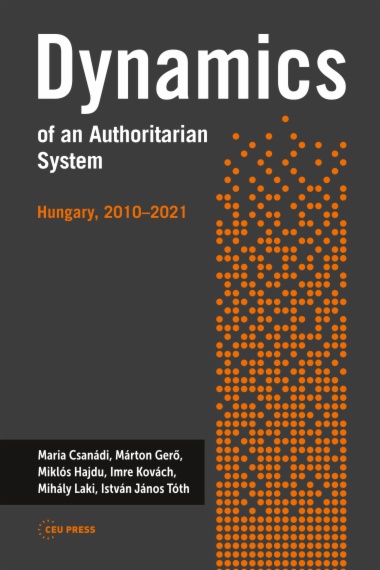This conceptually synthetic and empirically rich book demonstrates the vulnerability of democratic settings to authoritarianism and populism. Six scholars from various professional fields explore here the metamorphosis of a political party into a centralized authoritarian system. Viktor Orbán and his Fidesz party needed less than ten years to accomplish this transformation in Hungary. In 2010, after winning a majority that could make changes in the constitution – two-thirds of the parliamentary seats, they evolved and stabilized the system, which produced again the two-thirds majority in 2014 and 2018.
The authors reveal how a democratic setting can be used as a device for political capture. They show how a political entity managed to penetrate almost all sub-fields of the economy to arrive at institutionalized corruption, and how the centralized power structure reproduces itself. With the help of a powerful empirical apparatus—among others analyses of more than 220,000 public tenders, redistributions of state subsidies, and the interconnectedness of those privileged with the political elite — the authors detail the functioning of a crony system and the network aspects of political connections in the rapid enrichment of politically-linked businesses. Their studies demonstrate the role of political capture in this redistribution and how this capture leads to a new social stratification.
- Cover
- Front matter
- Half Title
- Title Page
- Copyright Page
- Table of Contents
- List of Figures
- List of Tables
- Preface
- Introduction
- Part I Metamorphosis of a Party into a System
- Chapter 1 Paths to Political Capture and Institutionalized Corruption in Hungary, 2010–2021
- System Evolutions in Comparative Perspective
- Political-Economic Context of Systemic Evolution
- From Political Dominance to Political Capture
- Diffusion of Political Capture into Autonomous National, Local, and Grassroots Institutions
- Expansion of Forced Resource Redeployment Through the Diffusing Channels of Political Capture
- Diffusing Channels as Avenues of Institutionalized Corruption Using Forced Resource Redeployment
- The Political-Economic Elite Nested in the Network of Institutionalized Corruption
- Domestic and External Factors Fueling Persistent Systemic Evolution and Self-Reproduction
- Conclusions
- Part II Reproduction Through Redistribution
- Chapter 2 Redistribution and Integration
- Introduction
- Welfare Redistribution, Social Integration, and Inequalities
- Project-Based Redistribution
- Recombinant Redistribution
- Conclusions
- Chapter 3 Cronyism in the Orbán Regime: An Empirical Analysis of Public Tenders, 2005–2021
- Introduction
- Literature
- Data and Indicators
- The Orbán Regime and MGTS+ Companies: Descriptive Statistics
- Models and Estimations
- Conclusions
- Annex 3.1
- Annex 3.2
- Chapter 4 Political Connectedness under Fidesz Governments and the Case of Mészáros Group of Companies
- Introduction
- Methodology: Data Collection and Processing
- Fidesz-Connected Entrepreneurs on the List of the 100 Wealthiest Hungarians
- Regulatory and Procurement Advantages or Favors
- Lőrinc Mészáros: Family and Business
- Summary and Open Questions
- Appendix
- Summary
- List of Authors
- Bibliography
- Subject Index
- Name Index
- Back cover

